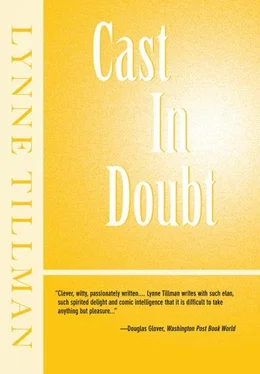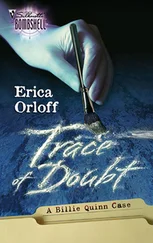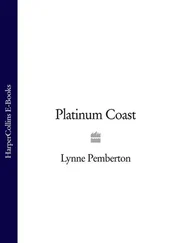A marvelous story. I could easily have imagined and placed Helen in a seat of honor at that tea party, as if the poet were the Mad Hatter. Roger harrumphed but eventually smiled. I didn’t trust any of his reactions that night, and I think I was right not to have done so. Roger was about to say something to Gwen, but just at that moment, by which time we’d all had a great deal to drink, and Yannis had shown up, the South African Poet, Wallace, and his amour, the Dutchwoman with the guttural name, arrived at our table from out of nowhere. This was Gwen’s first meeting with them, and after it, my memory grows weak.
Wallace was entertaining. Yes, he was. I’ll admit that, and even I found myself rapt as he told a story about — now, who was it? H.D.? No, it was Djuna Barnes. Wallace insists of course that he slept with her. It all comes back. No, he didn’t sleep with her. It was another poet who had, a homosexual, Wallace declared, a surrealist, Charles Henri Ford, in fact, and it was his story.
Djuna Barnes wanted to interview Hitler, and as she was friends with a man named Putzi Hofstingel who was close to Hitler, was his art adviser, something like that, she thought she had an inside chance. Barnes went to Munich to see him. I don’t know what year it was, Wallace left that out. Putzi was in love with Djuna, and, Djuna told Ford, Wallace says, that while she never made love with Putzi, he once hugged her so tightly, he burst a vein in his penis. At the time of the burst vein, Putzi and she were in New York; his family’s business was art, they ran a large art emporium. According to Djuna, according to Ford, Putzi was a marvelous piano player who often played for Hitler. Djuna never did interview Hitler.
This anecdote was the prelude to, the means to, the most persistent and abiding of Wallace’s impassioned literary concerns. He added something about T.S. Eliot, the old possum, having written the introduction to Nightwood , which appeared in 1936, and went on about Barnes’ discussions of race and religion in that difficult novel. What about the Jew as he appeared in Nightwood ? Wallace challenged. What of the Jew? Roger demanded. A heated and drunken discussion about art and politics ensued, and Roger, who sides with the formalists, and Wallace, who does not, went at each other like cat and dog. In this case it is hard for me not to think of Roger as the dog; I prefer cars. For my part I can see both sides, and as long as the work has quality, which is indifferent to politics, I can appreciate it.
Wallace returned us to life before World War II and enumerated a list of great and not-so-great literature that was anti-semitic-book after book. D.H. Lawrence’s The Virgin and the Gypsy , for one. To set a different tone, usually unsuccessful, I brought up Jane Bowles’ novel Two Serious Ladies and ventured that nowadays few would notice that one of the two serious ladies was a Miss Goering. Surely that had relevance — the novel was written when Hitler was in power, published in 1943, and Jane Bowles was Jewish. One didn’t, I reminded all assembled, easily admit to being Jewish then. I glanced at Roger, as it was for his benefit that I remarked upon hidden Jewishness. Roger didn’t wince, blanch or even wiggle in his chair. Roger ought to be a CIA operative.
Thinking about it now, it could have been many kinds of hiddenness I was referring to, even kinds of hiddenness that were predominantly hidden from me. The significance of Gwen’s race to her, of Roger’s and my homosexuality, of Wallace’s time in mental hospitals for having opposed apartheid. We were a ragtag band of inhibited outsiders, each a secret and keeping secrets from the others. And ourselves, I suspect. In our own idiosyncratic, careful ways.
I can remember just one other incident. Gwen snorted something about Hitler’s having been a great dancer, which, she explained, was a line from Mel Brooks’ movie The Producers . I had not seen it, nor had Wallace. But he took exception to Gwen’s insouciance. Indifferent to him, Gwen was hitting her usual cutting stride and was swaggering full tilt, certainly by the end of that long evening. I was, as I noted, reassured. And yes, Roger, I believe, did finally get to Gwen, at least he annoyed her, but I cannot remember how. Perhaps it is true, as Gwen often asserted, that I never remember the truly vicious moments. If so, I am a lucky man. Indeed today I am content. Human beings have no real memory of physical pain, I believe, yet psychical pain can plague one. Perhaps I am one of those happy few who can wipe clean from my fleshy slate even traces of nonphysical, verbal abuse.
I finish my notes of regret, and call again for Yannis, who takes them from me with a brazen nonchalance. I refuse to acknowledge his disrespect and ask him to hand-deliver them. Letters of regret — though what’s being regretted I’m not sure. No one will care. Had there been a party there could have been regret. There could have been all manner of trouble, given that confluence and cast of characters. It will come, the party, its stickiness, its aftermath; but it will not have come now or when it was expected to have come. It will have been delayed. The future perfect — plus perfect? — is an interesting condition, a tense little delved into. The future is not of course perfect. And in the notes I haven’t let on what I’m about to do; I have let that hang mysteriously — they would expect as much from me, I am famous for this kind of thing. It’s all in character, they will say. I have written that I will reschedule the party and, indeed, I will, when I return. No one will care. Perhaps Alicia will. She’ll be most curious. But I don’t have time to visit her to explain. And besides, John is ensconced in her house and I cannot possibly let him know my plan, for surely he’ll want to accompany me, even though Gwen said he cares not a fig about Helen. I don’t entirely believe Gwen, or rather, I am not certain that her interpretation of John, or his interpretation of Helen, is accurate. I am in fact entirely suspicious and dubious. He could have been pillow-talking.
The truth, the ugly truth, is that one can only surmise and approximate, without any exactitude, what even one’s very best friend bases his or her analyses upon. Conversation is the least propitious way to discover the truth. It is uncontrollable. Why do we do it? Why do I do it? One says it’s only talk, but in fact I think talk is dangerous. vernacularly speaking, I get into more trouble talking than by doing anything else. Others have great adventures; I merely speak. That’s the long and short of it, as my father would say. He was, conversationally, the short of it. Linguists theorize about the human need to communicate, the creativity of human beings in daily speech and language, and about the inventiveness of language, all of which clarifies and elaborates upon the idiom “talking for the sake of talking.” Talk is neither simple nor obvious. Human beings are perverse and complex. We can lie. We can be mistaken. One would never accuse an ape of being mistaken. Sometimes, when I am in the midst of one of those human inventions, I cannot imagine what it is that is being communicated. Although I can well believe that it has all been created on the spot. It cannot be controlled, can it?
Several papers spill off the bed and onto the floor — I have small bundles of paper as well as books at the foot of my bed, but I can assure one and all that I am not deranged and horribly messy like the eccentric Collier brothers. A lone sheet finds its way from its obscure position under the pile to the top, to visibility; it is something I wrote which I haven’t looked at in a long time.
Roger is an uncontrollable character. His ability to concoct, to invent, ought to become legend, for nothing else about him will live on. Or I suppose that might be said about me. Yet at least I’ve published more than one book, even if under a pseudonym. We like to say — Alicia and I — that he is a parvenu who pooped. I will make Roger known (isn’t this the rationale authors always offer to their “subjects” when they commit them to print?), but I will not give him feats of daring and derring-do. I will present him as he is, warts and all, just as Chaucer presented the Wife of Bath.
Читать дальше












